'The Babadook' is Still The Best Horror Movie So Far This Century. Here's Why.
- Oops!Something went wrong.Please try again later.
- Oops!Something went wrong.Please try again later.
- Oops!Something went wrong.Please try again later.
- Oops!Something went wrong.Please try again later.
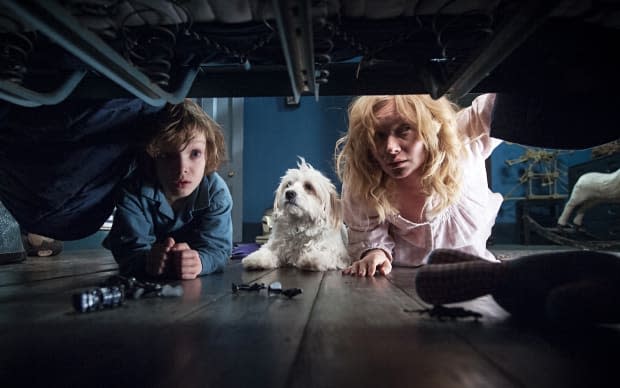
Following its premiere at the 2014 Sundance Film Festival, Australian writer/director Jennifer Kent's debut feature, horror pic The Babadook, was met with widespread critical acclaim. Following a turn-of-the-century dry spell in popular horror that was driven by the Saw series and other gory torture pics, critics praised it as a reminder that in the right hands, the genre is an art form, ripe for telling emotionally complicated narratives. Kent was praised as a fresh, creative feminist voice in cinema. The movie was a sleeper success at the box office, and over the past half-decade, it's become iconic--taking on an unexpected new life in the LGBTQ community (we'll get to that later).
In fall 2019, Kent's long-anticipated follow-up, The Nightingale, opened in theaters. Set in the 19th-century Australian wilderness, the drama (it's harrowing, but not a horror movie) stars Aisling Franciosi (Game of Thrones) as an abused young Irish prisoner who sets out into the bush on a quest for vengeance. It's important to note that with The Nightingale, Kent has done it again; she's simply delivered another extraordinary film with striking power.
Parade.com is taking a look back at what made Kent's debut feature such a distinct success. Here is why The Babadook remains the best horror film of the 21st century so far. The plot of The Babadook is discussed in detail, so there are spoilers ahead.
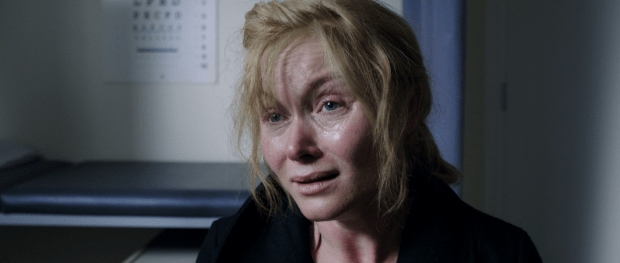
1. The Babadook is a supernatural thriller that tackles challenging real-life issues like grieving, caregiving, wellness, and the hardships of being a single parent.
The Babadook stars Essie Davis as Amelia, a young widow haunted by the violent death of her husband, Oskar (Benjamin Winspear). In a twisted and awful series of events, he was killed in a car wreck as he drove her to the hospital to deliver their son, Samuel (Noah Wiseman).
Fast forward to nearly seven years later, and a dark cloud is gathering. Amelia hasn't really grieved the loss of her husband, she doesn't sleep, and the kid's behavior is becoming increasingly erratic and taxing on her. That's when an extremely freaky, blood-red pop-up book called "Mister Babadook" appears in their home, written in rhyming verse that appears to promise a top hat-sporting specter is going to murder both of them. Kent allows us to decide what's real and what isn't as the Babadook continues to make his presence known by increasingly menacing means.
As wonderful, impressive, even pleasurable as all the moving parts and horror theatrics of The Babadook are, everything is secondary to character. The meat of the drama is Amelia's growing resentments, and the grief that threatens to tear what's left of the family apart.
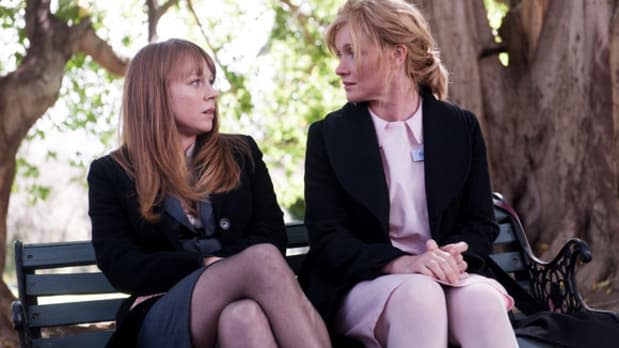
2. The characters and performances are among the strongest in horror history.
The Babadook wasn't eligible for Oscar consideration for complicated release reasons, and many rightfully said Davis was snubbed for a Best Actress nod, for a turn so intricate and mighty it would be oversimplifying it to say she's playing both Jack Nicholson and Shelley Duvall in The Shining. Amelia eventually, somewhat unexpectedly, becomes the monster of the movie, and it all wouldn't work if we ever fully lost sympathy for her.
That's where the subtleties of Kent's writing, which maybe only sink in upon repeat viewings, come in. It isn't a disposable side plot element that Amelia pays the bills by working in an assisted living facility for the elderly, specifically the dementia ward. That is demanding, important work, and it takes a special kind of patient, sweet soul to do it well, much less for a living. And we see glimmers of what a terrific, kind person Amelia is deep down early on in the picture. She stands up for Samuel when he's mistreated by his schoolteachers. She laughs and makes jokes. She helps her elderly neighbor Mrs. Roach (Barbara West) take out her garbage cans every week.
Related: 10 of the Best Movies Ever Made About Mental Health
Wiseman's mature turn, as a haunted kid riddled with anxiety and fear of abandonment, is just as remarkable--especially considering the actor was six years old when this was filmed. For anyone who complains about Sam's fits and outbursts being annoying: this is, to a science, exactly what hyperactive kids are like. He also brings the movie's biggest laughs to the table, and he's the rescuer in the end.
There are really disturbing scenes of Amelia verbally abusing Samuel. Props to Kent for shooting these carefully, so the child wasn't present for the worst of it. Hopefully, this can put to rest a long-standing toxic notion that a filmmaker must break an actor's spirit to get a suitable performance.
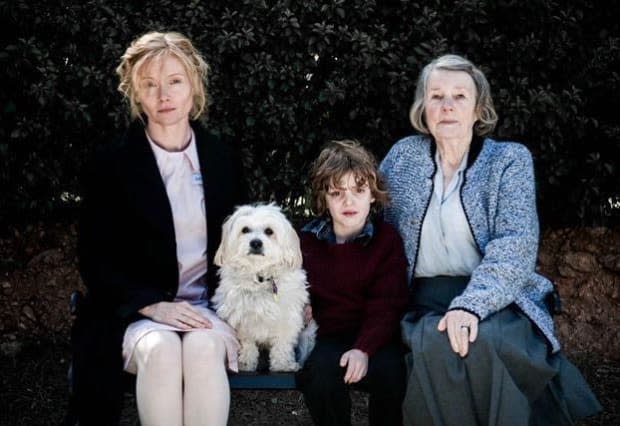
The Babadook is surgically concise, and it's mostly a two-hander; the side characters are exactly what they need to be. Amelia's dismal romantic life is embodied in her coworker Robbie (Daniel Henshall), who's well-meaning, but way too forward and borderline creepy. Amelia's clueless, self-centered sister Claire (Hayley McElhinney) is such a great character because she's so convinced she's always doing right by her. The simply but oh-so-effectively staged scene at the niece's birthday party is fantastic. Amelia is completely defenseless against the constant judgment and pandering of those who couldn't possibly grasp what she's going through.
Then there's Mrs. Roach. In a run-of-the-mill horror movie, the kindly old neighbor would have been slain, cannon fodder, a victim of the Babadook's terror. Here, she's a constant reminder of the caring person that Amelia was, that she's at risk of losing altogether.
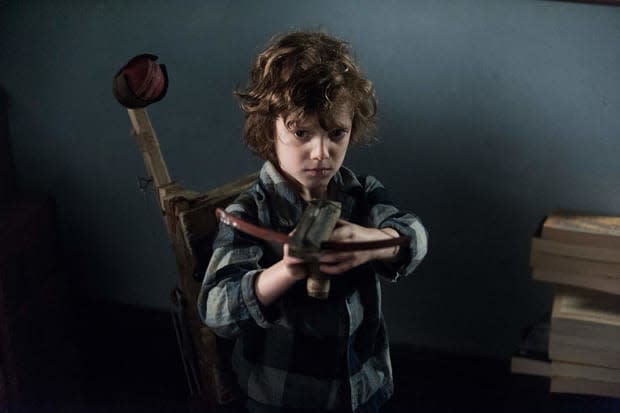
3. The Babadook more than delivers the requisite goods as a scary movie. It is a uniquely terrifying and unnerving experience.
This is a small-scale picture that pretty much runs the gamut of emotions. Kent's story is tender, even sweet. Also, the tension and dread she creates is merciless, hooking our most primal fears: spiritual fears like losing a loved one suddenly, being a bad parent, being unwanted and unloved--and more tangible, immediate fears like a boogeyman still being able to get to you in your bed even after you've pulled your blankets over your head.
There's a hard-hitting muscle to Kent's filmmaking (this is very much present in The Nightingale, too), but what really sets her apart is the overwhelming depth of feeling, empathy and even warmth that's underneath it all.
Related: Parade.com's Review of Nicolas Cage in Mandy
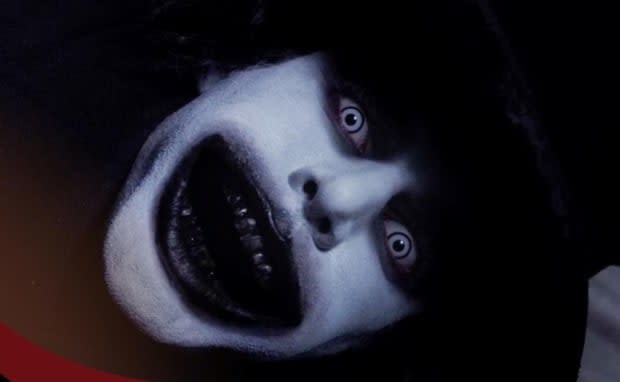
4. A boogeyman to rival them all.
Mister Babadook's imaginative design incorporates things that are rather universally acknowledged as terrifying: oversized top hats, unnatural, possessed features, knife hands, floor-length trench coats, and bug-like movement. When we first see Mister Babadook himself, he's a stop-motion creation that looks like Jack the Ripper as an insect. Shudder.
Remember the first time you saw this? This is climb-the-walls, scare-the-peanuts-out-of-your-M&Ms-scary stuff:
Mister Babadook is a shapeshifter, too. His most cruel and sinister form? That's when he appears as Oskar. What could be more agonizing for Amelia than taunting her with the man she lost standing before her, handsome and just like she remembers him?
For viewers, Mister Babadook's meaning can be as malleable as his physical shape. One reason people have connected to this film on such a deep level is that the title character can stand for any kind of haunted past, trauma or loss: something so powerful it can threaten to fundamentally change a person.
Related: The 20 Best, Scariest Horror Movies You Can Watch Right Now on Netflix
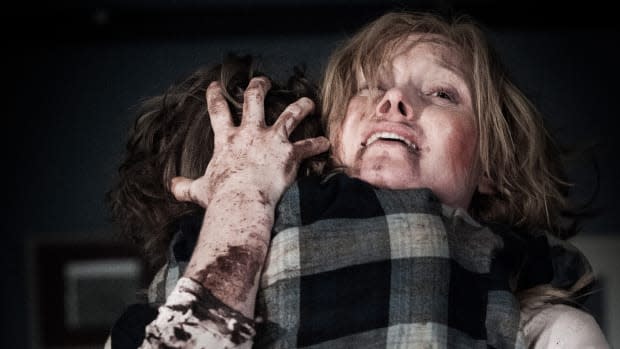
5. The Babadook is a dark film about the power of the light.
In the third act, The Babadook reveals a stunning psychological depth, and it goes from being a superior genre movie to something transcendent, the horror movie you recommend to friends who say they don't like horror.
Near the end, Amelia does what's painfully inevitable: she faces the darkness head-on. Because of the supernatural element, the film allows her to confront her dark side face-to-face, with some of the most elegant, thunderous writing you'll ever hear in a genre film:
"This is my house. You are trespassing in my house!"
The payoff of this scene is hard-earned, and the violent mechanics of horror make it more ferocious and exhilarating than such a scene could possibly ever be in a straightforward drama. It's not unlike that No Man's Land sequence that made Wonder Woman stand out from other stuff at the multiplex; it's a woman's inner triumph illustrated with special effects.
Even the most dedicated horror fan wouldn't have a hard time admitting that this genre, historically, is problematic from time to time--often for turning the suffering of women into spectacle. The hat trick of The Babadook is that it's centered on a woman who suffers horribly, and it's ultimately about how she navigates through that, internally. For a film that deals with such complicated themes, the message of the movie is very direct: Though it requires demanding and consistent lifelong work, we can recover and we can heal.
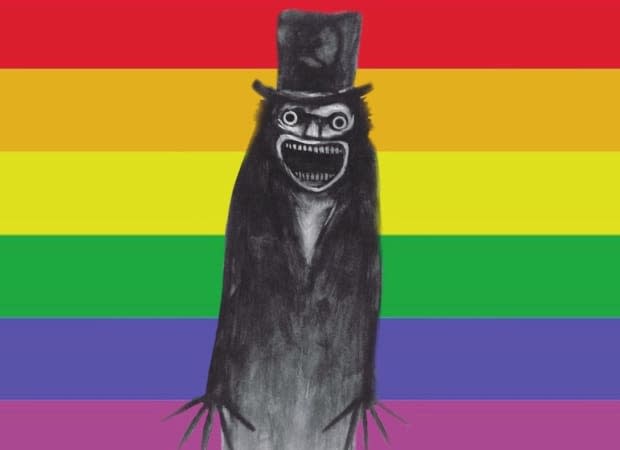
Lastly, about that whole gay icon thing...
In October 2016, a photo of The Babadook filed under "LGBT Films" on Netflix (which could have been Photoshopped) surfaced on Tumblr. The rest is history; internet users from around the globe offered alternative, often hilarious readings of the movie, to support this categorization. For instance, LGBTQ fans embrace the title character for his impressive showmanship and love of drama. Now, it looks like Mr. B is going to be a staple of Pride Month festivities until the end of time. Just try not to be Babashook by his bold and daring new Babalook:
As surely as The Babadook is a dark film that finds a ray of hope in the end, Mister B's second life as a joyous, festive figurehead is welcome-- if utterly, completely unexpected. It's so weird and out-of-left-field it works, and the spirit of the thing feels oddly appropriate. This is a very special and unusual film; don't be surprised if other pop-culture phenomena materialize around it.
The Babadook tells a story from A to Z, and, at least for now, there isn't a need for a sequel. What will really benefit audiences is Kent continuing to do exactly what she's doing with The Nightingale and beyond: telling unique and intimate stories with the power to impact lives. She's an uncompromising voice who came out of the gate with a masterwork; The Babadook defies convention and exceeds expectations while still managing to scare the living daylights out of us. Its reputation will only grow.
The Babadook and The Nightingale are available on Blu-Ray and major streaming services like iTunes, Amazon, Google and VUDU. The Nightingale is streaming on Netflix.
